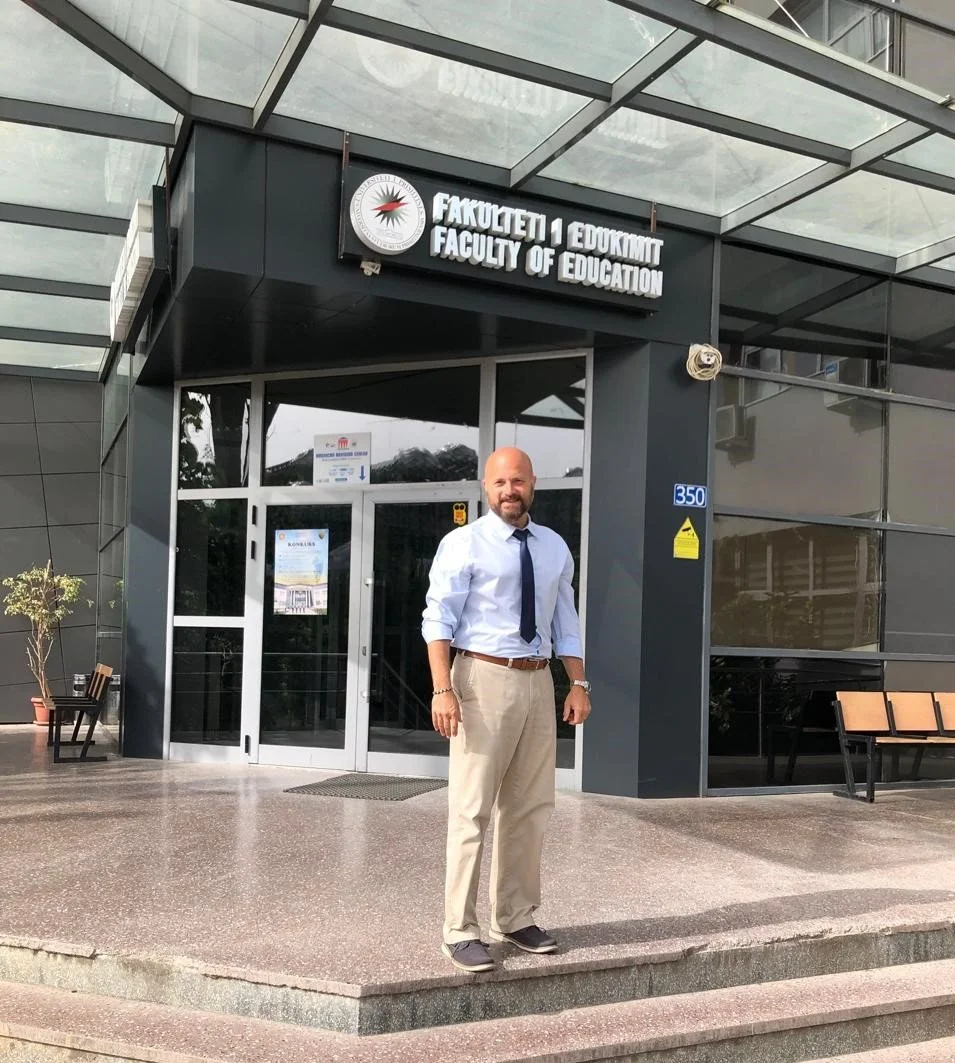Fulbright U.S. Scholar Spotlight: Cory Callahan
Applying and preparing for an opportunity like a Fulbright Scholarship can be a nerve-wracking experience. To ease your mind and provide you with an insider’s look into the Fulbright experience as a Scholar in Kosovo, we decided to catch up with our U.S. Fulbright community. We asked them to reflect on their Fulbright experience in Kosovo and answer a few insightful questions, from preparing their applications to what it was really like living and being engaged in Kosovo as Fulbright scholars.
We’re continuing our series of questions with Cory Callahan, Ph.D., an Associate Professor in the College of Education at the University of Alabama.
In addition to his 2023–2024 award as a Fulbright Scholar to Kosovo, Cory previously visited Kosovo as a Fulbright Specialist, collaborating on the development of a teacher-education program focused on civic education. Read more about this here.
The Fulbright U.S. Student Program offers Study/Research Awards to recent college graduates, graduate students, and early career professionals. These awards allow grantees to design their projects, which typically involve working with advisers at foreign universities or other institutes of higher education, including here in Kosovo.
More info here: https://us.fulbrightonline.org/applicants/types-of-awards/study-research
What is your educational and professional background?
I defended my dissertation from Auburn University and now teach students and conduct research at the University of Alabama, where I have been for 10 years. Before earning a PhD, I taught secondary students for 14 years and practiced the craft of social studies instruction the way I promoted it in presentations, workshops, and scholarly writing. This 2024 Fulbright U.S. Scholar Award is a fantastic honor, a true professional milestone that, in accepting it, I hope highlights the talented colleagues and students I work with and the supportive family I am blessed with, especially my wife Amy. This award recognizes all of our important work and sacrifices.
Why did you choose to apply for the Fulbright Program?
It seems to me that many Kosovars want to advance democracy in their nation through responsible citizenship; they want to promote democracy by helping their neighbors and fellow citizens (current and those of the near future) participate thoughtfully in a pluralistic republic. Strengthening democratic culture through dynamic civic education necessarily places teachers and teacher educators at its center. And as the nation’s leading teaching school, the Faculty of Education at the University of Prishtina “Hasan Prishtina” is perfectly positioned to lead the way.
Could you tell us about your experience as a Fulbrighter in Kosovo?
I designed a teaching and research project, Civic Competence for International and Global Education, to support Kosovar educators and positively influence the next generation of the nation’s teachers and teacher educators by facilitating their further development of civic competence. I planned to support teachers’ pedagogical knowledge and skills, increase their understanding of sociocultural influences in education, and further strengthen the Kosovo-U.S. relationship. The project featured interactive and dynamic inquiry-based instructional approaches intended to inform (1) civic education programs, (2) syllabi and curriculum materials for teacher education courses, and (3) professional development opportunities for teachers.
I am hopeful our work can, over time, advance the lived experience of democratic citizens in their great nation and in our world. And I am honored and humbled to make my very modest contribution.
How do you plan to implement the knowledge gained as a part of the program after you return to the U.S.?
For my home institution, the University of Alabama, I am planning to make at least two lunchtime presentations: one for my department and another for the international center on campus. I hope to inspire colleagues and students to apply for Fulbright awards.
For the academic community: I have submitted a manuscript for publication that prominently features curriculum materials centering around a historical photograph from Kosovo’s past; I collaborated with two Kosovar colleagues to develop and revise those curriculum materials. While at the University of Prishtina, I also worked closely with a third colleague to craft a manuscript concerning curriculum theory that prominently features Kosovo education policy and curriculum. We will submit this manuscript soon.
For my personal communities: Amy, Claire, Reese (my wife and daughters who accompanied me to Kosovo), and I plan to invite friends and family (especially Grayson and Joshua, our sons who could not accompany us because of their collegiate obligations) over to our house for a type of Kosovo Cultural Experience.
We plan to show our pictures, share stories of our experiences, and serve Kosovar cuisine (i.e., Flija, mantia, burek, Turkish coffee, etc.).
How was the application process for you, and what advice do you have for prospective candidates?
Be concise.
What is your favorite place you have visited in Kosovo while participating in the Fulbright program?
I enjoyed the Rugova Valley (e.g., its stunning views of the “Accursed Mountains,” its cliffs, slopes, waterfalls, peaks, and hiking trails) and the Cathedral of Mother Teresa in the capital city, Prishtina (e.g., the bell tower and the view of the city from atop it, and the spectacular stained-glass windows and mosaics). However, my favorite place in Kosovo is probably the Bear Sanctuary, a project by FOUR PAWS International (a global animal welfare organization), a place where bears- and a lion are treated with great respect.
What is your favorite Kosovar dish/food?
Without question, my favorite Kosovar food is homemade flija. Flija from a local bakery is quite good; however, homemade flija is fantastic.


